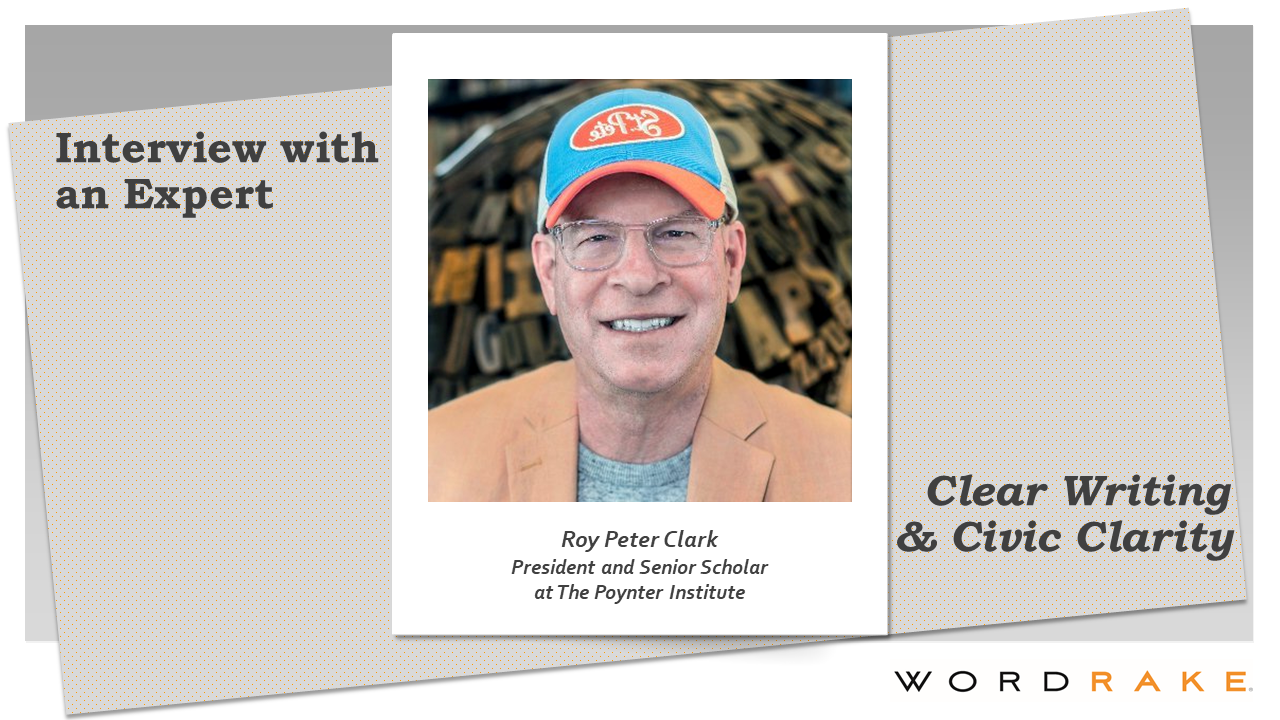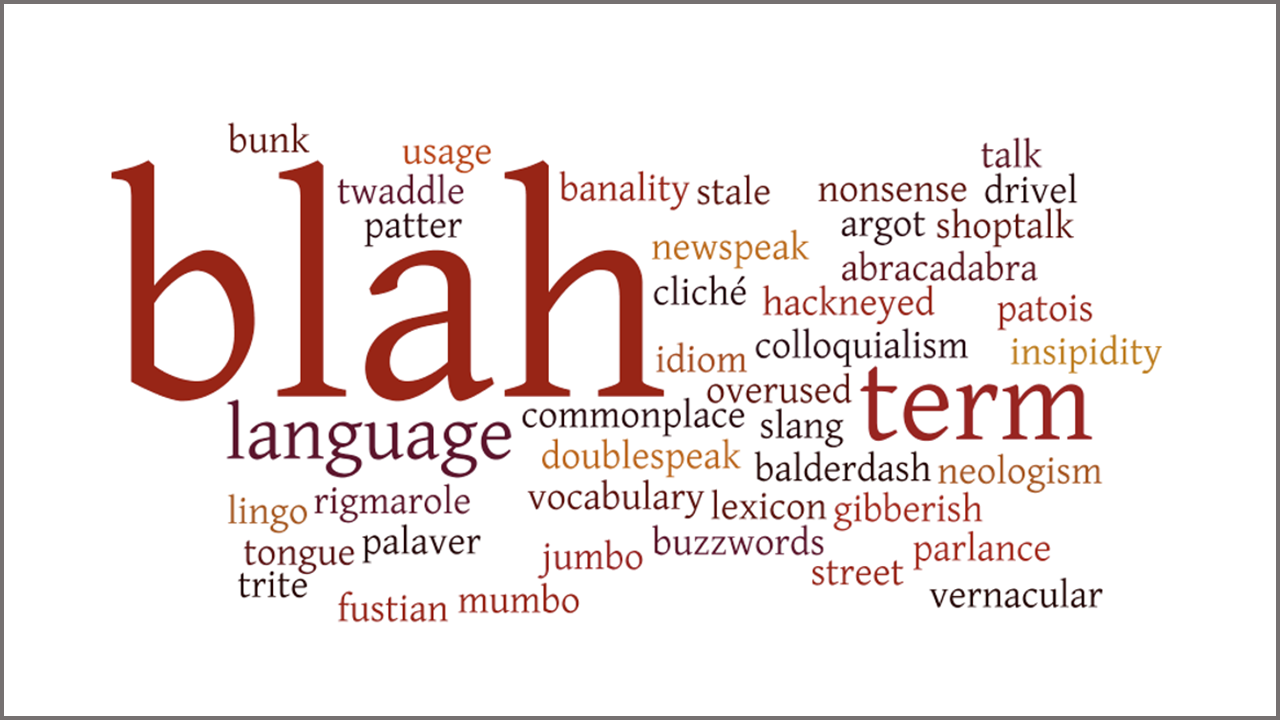Anyone who writes for the public must do so clearly. While it’s easy to complain about legalese, business-speak, and medical jargon, unclear writing that harms the public can come from another place: the news.
Since 1975, the Poynter Institute for Media Studies has been leading the charge for journalistic integrity and clear writing with hopes to fortify journalism’s role in a free society. As stewards of public information, journalists must deliver the information in a manner that the public can understand.
We spoke with renowned author, former journalist, and senior scholar for Poynter, Roy Peter Clark, about plain language and its connection to a concept called “civic clarity.” Read this interview for insight on making hard facts easy reading. Then ask yourself the 20 questions for civic clarity that will help writers solve problems and satisfy their duty of clear communication.
What prompted your interest in clear communication and plain language? Why is clear communication important?
When I came into journalism in 1977 as a writing coach, my first move was to share powerful stories, usually written in narrative forms: stories about wars, blizzards, famines, and wildfires. These were great tales written in the public interest, and reading them inspired other writers to work on their craft.
But I came to realize that narrative power was only one end of a spectrum of good public writing. At the other end is what the Canadian scholar Stuart Adam called “civic clarity.” That is achieved when writers take responsibility for what readers know and understand.
But how does a writer make harder facts easier reading? I have been collecting tools and strategies for many years: slow down the pace of information; use shorter words, sentences, and paragraphs at the points of greatest complexity; translate jargon; and many more.
For example: Is the vaccine safe? Sadly, a clear, well-reported, fact-checked report may not be enough to overcome the “confirmation bias” of the reader. That should never deter us from finding things out, checking things out, and reporting them in a way that gives readers a chance to understand practical truths and pass them along to others.
What is the relationship between plain language and civic clarity?
I had not asked myself this question until Ivy Grey raised it for me. As I often do, I look to George Orwell for an answer. In one essay, Orwell describes the power of “demotic speech,” which is the language of rank-and-file citizens. If the British people were to be persuaded to make the sacrifices necessary to defeat the Nazis, encouragement must come not from the stuffed shirts at the BBC or highly educated aristocrats, but from voices with which common people can identify.
(Churchill, of course, is a key figure to study.)
Demotic speech or plain language becomes a two-edged sword. It can be used by a doctor from the CDC warning the American people of dangers to public health, but it can also be used “hypothetically” by populist demagogues on social media. No surprise—and as Orwell predicted—you can lie with plain language; you can spread disinformation with plain language; you can spread malicious conspiracy theories using plain language.
Enter “civic clarity” as a booster shot for plain language. Plain language is a tool, but civic clarity is an effect. Civic clarity, more than plain language (I think), makes the necessary leap from journalistic craft to mission and purpose. That moves me not just to state the facts plainly, but to put them in a context that makes meaning in the public interest.
20 Questions Towards Civic Clarity
If writing in plain language is about making it possible for readers to understand, then writing with civic clarity helps create the foundation for understanding. Ultimately, civic clarity is about taking responsibility for what readers know and understand.
If you are a writer or an editor entrusted with communicating complex and quickly changing information to the public, then ask these 20 questions to stay on task:
- How would I explain this to a smart person that I know—who is NOT an expert?
- What are the three most important things I learned that I now have to unlearn to avoid what Steven Pinker—the cognitive psychologist, linguist, and popular science author—calls the “curse of knowledge,” an inability to start not with what we know, but with what our readers do not yet know?
- Where are the points of greatest complexity so that I can slow down the pace of information there?
- Have I used shorter words, sentences, and paragraphs at the points of greatest complexity?
- Which numbers are necessary? Which ones are unnecessary and can be avoided?
- Is there heavy cargo—technical data, numbers—that can be lifted from the text and placed in an illustration, informational graphic, or list?
- Where is the jargon, the technical language that came with the experts? What jargon terms can be avoided? Which ones need to be translated so that readers learn the secret codes?
- Have I found an expert who can explain things in plain English and who can be quoted without sacrificing technical accuracy?
- Can I say with certainty that I have found my focus—the one key piece of knowledge I want to impart? If so, do all elements of the report support it?
- Can I find a “mentor example,” a microcosm or small world that represents a larger reality, an intensive care unit rather than a whole hospital complex.
- Is there a scene I can observe directly that allows me to create a telling experience for my readers?
- If I am writing about a policy, have I explored its impact, the effect a change might have on key stakeholders?
- Can I explain something by focusing on the experience of one human being? A small group?
- Are my sources diverse enough so that I can reveal all of the key stakeholders and several points of view?
- What story elements—character profiles, dialogues, scenes, anecdotes—offer context for the information in my report?
- If I were to give my readers a pop quiz on my story, would they be able to pass based on the information I have provided?
- Is my story so clear that a reader could pass along the most important information to another person?
- Can an analogy help me take an unfamiliar or complex concept and make it familiar?
- Is there less useful information I can delete from my report, so that readers are left with only the most useful?
- Even though my work is clear, have I made it interesting enough so that readers will care?
About Roy Peter Clark
Roy Peter Clark has taught writing at the Poynter Institute since 1979. He ranks among the most influential writing coaches in the world of journalism and beyond. He is the author or editor of 19 books, his most popular being “Writing Tools: 55 Essential Strategies for Every Writer.” He is working on his 20th book, due out in 2022. The working title is “Tell It Like It Is: The method and mission of public writing in an age of pandemic and disinformation.”
Plain Language and Clear Communication Interview Series
This interview is part of a series produced in connection with WordRake’s support for the Access for All: Plain Language is a Civil Right conference. WordRake is editing software for sophisticated writers who must communicate clearly. It improves writing by simplifying and clarifying text, cutting jargon, and recommending plain English replacements. WordRake runs in Microsoft Word and Outlook, and its suggestions appear in the familiar track-changes style. You decide when to run WordRake and which edits to accept, so you get quality and speed without sacrificing control. Editing for clarity and brevity has never been easier. Try WordRake for free for 7 days.
Questions on Civic Clarity reprinted with permission from Roy Peter Clark. It originally appeared on the Poynter blog on September 10, 2020.







